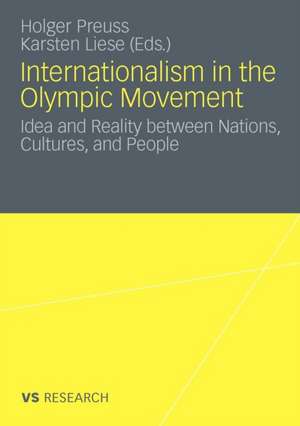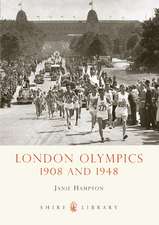Internationalism in the Olympic Movement: Idea and Reality between Nations, Cultures, and People
Editat de Holger Preuss, Karsten Lieseen Limba Engleză Paperback – 8 apr 2011
Preț: 378.92 lei
Nou
Puncte Express: 568
Preț estimativ în valută:
72.51€ • 77.53$ • 60.45£
72.51€ • 77.53$ • 60.45£
Carte tipărită la comandă
Livrare economică 18 aprilie-02 mai
Preluare comenzi: 021 569.72.76
Specificații
ISBN-13: 9783531180007
ISBN-10: 3531180002
Pagini: 160
Ilustrații: 160 p. 8 illus.
Dimensiuni: 148 x 210 x 10 mm
Greutate: 0.2 kg
Ediția:2011
Editura: VS Verlag für Sozialwissenschaften
Colecția VS Verlag für Sozialwissenschaften
Locul publicării:Wiesbaden, Germany
ISBN-10: 3531180002
Pagini: 160
Ilustrații: 160 p. 8 illus.
Dimensiuni: 148 x 210 x 10 mm
Greutate: 0.2 kg
Ediția:2011
Editura: VS Verlag für Sozialwissenschaften
Colecția VS Verlag für Sozialwissenschaften
Locul publicării:Wiesbaden, Germany
Public țintă
ResearchNotă biografică
Dr. Holger Preuss is a Professor of Sport Economics and Sport Sociology at the Institute of Sport Science, Faculty of Social Sciences, Media, and Sports, at Johannes Gutenberg-University Mainz, Germany.
Karsten Liese worked as a Scientific Assistant at the Johannes Gutenberg-University Mainz and for the National Olympic Academy of Germany. He currently works as the Federal Adviser in charge of the Sports Committee for the CDU/CSU Faction at the German Parliament.
Karsten Liese worked as a Scientific Assistant at the Johannes Gutenberg-University Mainz and for the National Olympic Academy of Germany. He currently works as the Federal Adviser in charge of the Sports Committee for the CDU/CSU Faction at the German Parliament.
Textul de pe ultima copertă
The idea of “Internationalism” has manifested itself not only in the intercultural dialogue within the Olympic Movement, but also at the Olympic Games as the sportive, cultural, and media peak of the four-year-circle. The authors analyze and discuss Internationalism from different professional perspectives, against different cultural backgrounds, as well as in relation to diverse reference groups to widen the understanding of Internationalism as a social interaction in the Olympic Movement. They also aim at establishing the intersections and equal normative principles of “Internationalism” within the different cultural and institutional fields. These common grounds may be useful for the practical implementation and realization of “Internationalism” through Olympic sports and at Olympic Youth Camps.
This book is valuable reading for academics, practitioners, and policy makers in the field of sport sociology and Olympic studies.
This book is valuable reading for academics, practitioners, and policy makers in the field of sport sociology and Olympic studies.





